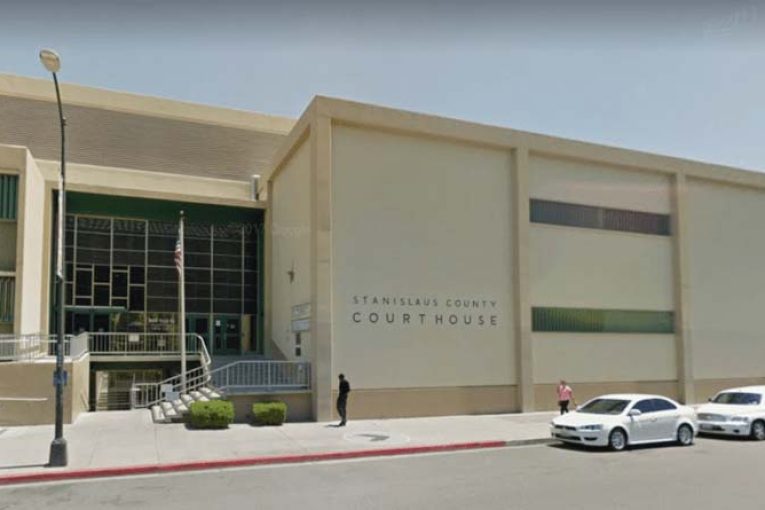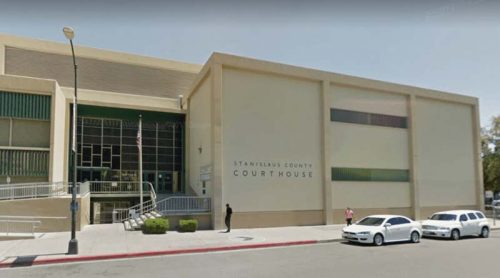

By Fatimah Patel
STANISLAUS, CA – Jesse Sebourn served 10 years in prison for a voluntary manslaughter charge, “several years beyond” what either the defense or prosecution argued for during his resentencing hearing this week in Stanislaus County Superior Court after his successful appeal for resentencing under new state laws.
Concluding his hearing, Judge Carrie Stephens ruled Sebourn will be “committed to the Department of Corrections for a period of three years… (and) placed on parole for a period of two years following his release from prison.”
Sebourn was convicted under an older version of the felony murder rule, one in which people could be convicted of felony murder if someone died during the commission of a felony—even if the accused had no intent to kill nor any knowledge of the murder.
The updated law prevents people from being charged with felony murder if they had no direct involvement, which defense attorney Brian Ford believes was “created for Sebourn.”
There were two main issues argued during the hearing: 1) whether or not the gang enhancement for Sebourn’s charge should be kept; and 2) whether this crime counted as an assault likely to produce great bodily injury or an assault with a deadly weapon/instrument other than a firearm.
Regardless, Ford’s main priority was getting Sebourn out of prison, and he noted, “Mr. Sebourn is entitled to a credit time served sentence and he’s several years beyond what that would be in any case. We’re definitely not looking to delay things,” he said.
The defense attorney added “hanging a strike on him (for conspiracy to commit assault with a deadly weapon) after he’s done 10 years of what is now an unlawful theory I think is somewhat unjust.”
Off the record, Judge Stephens asked for proposals from both sides.
Prosecuting attorney Amy Neumann proposed a “conspiracy to commit assault… keeping the gang enhancement but applying the five year term to the gang enhancement, which would be applicable to an assault.”
Ford then noted to the court that “both the prosecution and I agree that no matter which way this goes, we’re looking at ultimately a credit time served resolution. The difference here is one, whether or not the gang enhancement applies, and two, whether the court is going to redesignate the offense as (an assault likely to produce great bodily injury or an assault with a deadly weapon).
“Under (the new felony murder law)… if the People fail to meet their burden at the order to show cause hearing, then the court is to vacate the murder conviction and to sentence on whatever other offenses remain. If that were controlling, there wouldn’t be any other offenses charged. There’s nothing left,” he argued.
In regard to the second issue of what type of assault this was, Ford maintained, “If it’s a (conspiracy to commit assault likely to inflict great bodily injury), that’s not a strike and that’s what we would be seeking on the defense side.
“If it’s an (assault with a deadly weapon or instrument other than a firearm), then it is a strike and it has the effect of simply being a longer paper commitment than what the court would be looking at otherwise,” defense counsel added.
Neumann responded, stating the prosecution is seeking an assault with a deadly weapon or instrument other than a firearm “being that (Sebourn) had weapons loaded in his car that were other deadly weapons. That was the intent.”
Ford, though firm in his arguments, made it clear that his main priority was getting Sebourn out.
“Our issue here is either way, Mr. Sebourn is entitled to a credit time served sentence and he’s several years beyond what that would be in any case. We’re definitely not looking to delay things.
“The defense position is that (assault likely to inflict great bodily injury) is more appropriate, but we’re gonna submit on whatever the court wants to decide today. The only remaining issue is whether or not the gang enhancement applies.”
Ford added, “I think under (the petition for resentencing) if the People fail to meet their burden at the order to show cause hearing, the enhancements are discharged as well. Even if they’re not, I think that those enhancements have to be supported by the record and I don’t think that they are upon this based on the briefings that we did…the change to the gang statute… redefined what qualifies as predicate offenses…
“The key point here is that under the change in law, the crime has to be done for benefit of the gang that’s more than merely reputational. I think that the way that this case is charged… there’s nothing supporting that (prior allegation).”
Ford again asserted that “these are kind of soft issues for the defense because ultimately the more important issue for us is getting Jesse out without delay because he’s already beyond whatever his sentence would be regardless of what the court decides today.”
He argued “there’s still an issue as to what acts he’s actually assisting on and if we’re going with a conspiracy on the (assault with a deadly weapon or instrument other than a firearm), hanging a strike on him after he’s done ten years on what is now an unlawful theory I think is somewhat unjust.
“I don’t plan on arguing a whole lot on the record, I just want to make sure the court understands the range of options here because again we’re really just trying to make sure that we get this processed,” he concluded.
Judge Stephens clarified that this is about two issues, the first being “whether this case is going to lead to a conviction for conspiracy for (assault with a deadly weapon/instrument other than a firearm) or (assault likely to produce great bodily injury).
“The second issue is if the court should find true gang enhancement. And there are a lot of issues about that.
“One is that he admitted it and plead to that… The second issue is does this court have to abide by the change in (the gang enhancement statute) at this resentencing hearing. And I don’t know what the state of the law is on that.
“But I do acknowledge that he actually admitted at trial the gang enhancement.”
DDA Neumann cited case law for the judge. After a break, both parties reconvened and officially called Sebourn’s case.
Neumann stated, “The People are seeking a conspiracy and assault charge… it is a strike…The People are also seeking a gang enhancement because (Sebourn) admitted a gang enhancement at the plea hearing. That would be a five year enhancement… The People are also seeking two years of parole.”
Judge Stephens asked Neumann what she believed the sentence calculation should be.
“A minimum of three years for the assault charge” and five years for the gang enhancement “so a total eight year sentence,” Neumann replied.
The judge asked Ford for his opinion, to which he said, “When the People failed to meet their burden… any allegations and enhancements attached to the conviction shall be vacated.
“It is our position that an assault with great bodily injury is the appropriate target offense to sentence under… (The gang enhancement) should be vacated. The only way (it) should be maintained is if there’s a sufficient record of proof on the record… I don’t think the admission is enough. We’re asking for six years for Mr. Sebourn,” Ford concluded.
Neumann reiterated Sebourn “admitted he was acting to benefit the gang… (and) the change in the law doesn’t apply because he made an admission. It should be a strike… They were looking to kill or to assault with deadly weapons (Sebourn) had loaded in his car… That was a violent and serious crime that they were headed out and conspired to do.”
“We urge the court to impose a strike and to impose the maximum amount of parole that is allowed,” Neumann concluded.
The judge ruled Sebourn’s charge will be an assault with a deadly weapon, and the gang enhancement will be vacated, as requested by the defense.
“It seems clear to me that the underlying offense was (an assault with a deadly weapon other than a firearm)… The court will not add to that the gang enhancement. I know the defendant admitted it and I know that if he had admitted it under the present iteration of the statute, it would be very different.
“But the statute changed substantively since his admission in that it changed the definition of what is meant by benefiting the gang. And that was a substantive change, and so when he admitted it, he could have been admitting the older version of the statute instead of the new,” the judge explained.
“And so the court is not going to add the gang enhancement and not impose any judgment because of the gang enhancement. The defendant is committed to the Department of Corrections for a period of three years…placed on parole for a period of two years following his release from prison,” the judge added.
Sebourn was ordered to pay a $300 restitution fine, $40 court security fee, and a $30 court operations fee.
Ford requested a stay of the fines and fees because “Sebourn has been in custody and unemployed since Feb. 14, of 2013.”
“Has your client had any earnings (in custody)?” Stephens asked.
“Like 11 cents (an hour),” Sebourn replied. “Around like $11-12 (a month).”
“I have to consider… Mr. Sebourn’s present ability to pay those fines and fees. They’re not a large amount. He worked before he was placed in custody and so I would assume he has the ability to work when he’s released from custody,” Stephens reasoned.
“I anticipate he will,” said Ford.
“I don’t see that (the fines are) so excessive that Mr. Sebourn cannot pay those within the two year period of time that he’s on parole. So the court will affirm those orders,” Stephens decided.
“Mr. Sebourn, I wish you well. I hope to never see you back in this department ever again… I don’t want to see you in trouble again,” she told Sebourn.
“You won’t see me again,” Sebourn declared.